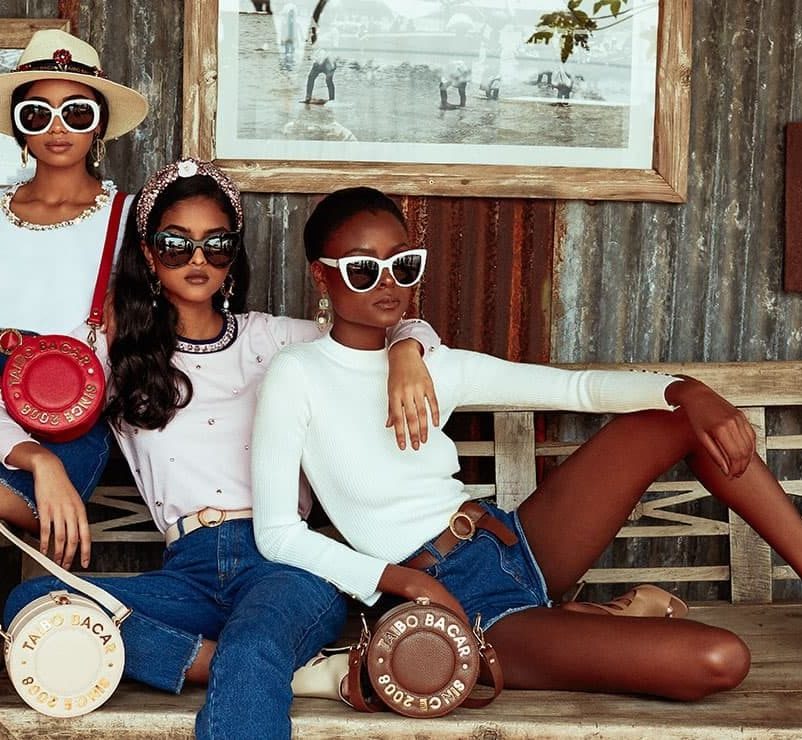
Despite its modest Mozambican beginnings, Taibo Bacar’s fashion house is already competing on worldwide catwalks and in upscale shops.
One of Africa’s top fashion firms, Taibo Bacar is recognized for its innovative blending of high and fast fashion items. The brand’s signature pieces, which tell personal tales with a splash of color, exquisite cutting, and detailing, have received multiple honors and elevated it to the worldwide scene.
A pioneer in the field, the innovative fashion label was the first African brand to present at Milan Fashion Week in 2010.
In The Beginning
Before Taibo Bacar the fashion house, there was Taibo Bacar the creator, whose mother, a seamstress, served as his initial source of inspiration. When the designer ran into the model Tatiana Ismael at a fashion event in 2006, his path to the fashion hall of fame was sealed. That unexpected encounter developed into a successful company, the Taibo Bacar label, three years later.
Tatiana Ismael is a business expert with extensive knowledge of the commercial side of the fashion industry, making her the perfect business partner for designer Taibo Bacar. Ismael manages the business end of things, and Bacar, the designer, adds his creative flair. As a company, Taibo Bacar seeks to establish a close relationship with customers
“We are very deliberate in our designs, starting with the conceptualization of our concepts or themes and continuing through the production process. We wish to develop a personal relationship with each of our customers. Ismael: “That’s how fervent and sentimental we are about our profession.
This philosophy is driving the Taibo Bacar label to embark on yet another ground-breaking business initiative as it unites to go beyond beautiful fashion and glossy publications and forays into the niche luxury brands market to support its fashion business.
In response to the company’s intended entry into the high-end luxury sector, Bacar says, “It’s about diversity. We have a lot of initiatives set up for the future that have been inspired by what we have been doing for the last 12 years, even though not all of them are related to fashion.”
The Intellectual Property Challenge
However, not everything has been perfect, particularly in a nation that is new to the fashion industry and where there is a lack of public understanding of the significance of respecting the creations and innovations of others.
In general, protecting intellectual property (IP) in Africa is exceedingly challenging.
Ismael claims that it is harder for creative sectors like fashion and even more so for us in Mozambique because the business of fashion is not well-defined.
Ismael points out that in order to ensure that intellectual property is treated seriously as a commercial asset, more needs to be done to educate the public about it in Mozambique and throughout most of Africa.
Aspiring young African designers should focus on developing their brands and companies rather than getting distracted by popularity and celebrity status, says Taibo Bacar.
Even if the Taibo Bacar name and the logos and visuals that go along with it are registered as trademarks, it might be challenging to uphold these rights in court.
Ismael believes that this is a price that the firm must carry as the sector develops, pointing out that while registering trademark rights is a crucial step in fostering future corporate growth, it is insufficient to stop acts of infringement.
Even when they have patents, copyrights, or trademarks, she adds, “businesses and individuals must constantly deal with the difficulty of people using their brands and making money off of their work.”
Since its T-shirts and insignia have been copied and duplicated by counterfeiters, Taibo Bacar is all too familiar with this threat.
The difficulty is frequently made worse by the burdensome and complicated legal system, which deters many authors from pursuing legal action to obtain redress.
When someone is not even aware that what they are doing is prohibited in the first place, how is it even feasible for them to comprehend the significance of respecting IP rights? Asks Bacar.
Campaigns to raise IP awareness must also target the general public, who use our goods and services and engage with our brands, in addition to innovators and creatives.
It’s a challenging situation for a forward-thinking fashion company to be in, and it’s made worse by out-of-date IP rules that, when they were established, did not take the issues of the digital age or a fashion company like Taibo Bacar into consideration.
Industry stakeholders are confused by the ambiguity surrounding how to address new IP challenges and where to turn for assistance in managing them.
However, outside of Mozambique, in developed nations like South Africa, where the Taibo Bacar brand is well-known, the situation is significantly better.
We are aware that as a global brand, we must protect our intellectual property in numerous nations. Thank goodness, South Africa’s intellectual property rules are more stringent and its attorneys are more knowledgeable on the subject, the designer said.
IP protection has become crucial for the business as the Taibo Bacar brand expands globally and enters the international market.
The business made the decision to create a division to manage all IP issues in order to free up Bacar and Ismael to concentrate on the day-to-day tasks of designing, manufacturing, and marketing their products.
Currently, photographs, brand names, and logos are all included in Taibo Bacar’s trademark portfolio.
In Mozambique, the business has established trademark protection for 10 of its logos, which illustrates how the brand has changed over time. Additionally, the business owns four South African registered logos.
It is also thinking of patenting some of its methods and goods, but doing so would be expensive and there is no way of knowing if the anticipated patents would stand up to court challenges.
“Patents cost a lot of money.
The attorneys we’ve spoken with have cautioned us because we need to be prepared to defend our inventions and products in the event that someone else develops a variation of them, says Ismael.
Despite the difficulties, the designer is still committed to preserving the works and designs that are particular to the Taibo Bacar brand.
These include the entirety of their leather goods selection, which primarily consists of purses and belts.
Collaborating With Creatives
By its very nature, fashion is a collaborative industry that frequently brings together jewelers, photographers, videographers, models, filmmakers, and even software engineers. Taibo Bacar is aware of the difficulties that can arise when artists must share or exchange their intellectual property in order to collaborate. Therefore, it is crucial for creatives to be knowledgeable about IP.
“Collaborations frequently present us with difficulties. Therefore, before doing deals, we are very careful to sign contracts or non-disclosure agreements, says Bacar.
Such action, he observes, is crucial in photography since the premature release of images can endanger marketing efforts, particularly in light of the fact that even models now take shots of their photo shoots with their phones.
“The photographs cannot be released on any platform prior to the event while we are running a campaign.
Since photography is such an important part of our business, we must be in complete control of the process at all times, from shooting to editing to designing.
To govern our commissions and the photographers’ intellectual property rights, we have very tight contracts, according to Bacar.
By making sure that their work is properly attributed when utilized by third parties, including publications, he continues, they are dedicated to preserving the intellectual property rights of photographers.
Managing the models and the photographs they take is less difficult because they frequently sign extremely detailed contracts with international modeling agencies.
Advantages Of Globalization
Taibo, a proponent of globalization, challenges African designers to look outside their own continent and quit being unduly protective of its traditional history.
“We must accept globalization and acknowledge that, while protecting our own heritage, we cannot expect to gain anything from other cultures. We open ourselves to opportunities outside of our boundaries by sharing our traditional knowledge and resources with the world and showing the amazing work we can produce in Africa, according to Bacar.
His claim is supported by experience, His innovative use of the traditional and vibrant Mozambican capulana fabric earned him the Emerging Designer of the Year Award at Africa Fashion Week in Johannesburg in 2012. As a result, he was given the once-in-a-lifetime opportunity to network with over 100 prominent designers in Rome, Italy.
We open ourselves up to opportunities outside of our boundaries by sharing our traditional knowledge and resources with the world and showing the wonderful art that Africa is capable of doing.
Bacar is optimistic that Africa won’t always be at the bottom of the fashion business food chain and that the market will develop into a vibrant, cutthroat sector producing fabrics.
Currently, the business operates stores in Mozambique and South Africa and sells its designs on a global scale online.
Through a franchising endeavor in South Africa, expansion plans were launched in 2019, but they had to be shelved owing to COVID-19. To serve the South African market, a number of stores continue to carry their designs.
Parting Shot
The designer gives advice to aspiring young African designers to focus on growing their brands and businesses rather than getting distracted by popularity or superstar status.
The issue is that the majority of these young creatives aspire to be designers but don’t realize that their priority should be developing a brand. Therefore, rather than working independently, their activity needs to be structured inside the framework of a firm that functions profitably.
That counsel is based on the expertise and experience gained during Taibo Bacar’s personal entrepreneurial path. And it’s how the designer has distinguished herself and made a statement.
Content courtesy of WIPO, Taibo Bacar & NFH
Related




